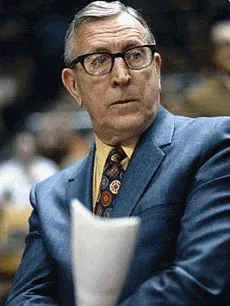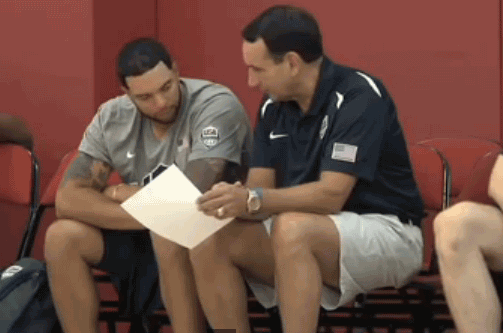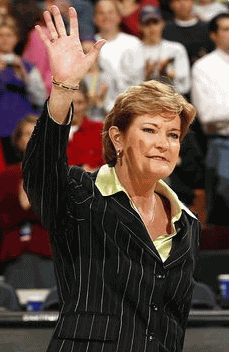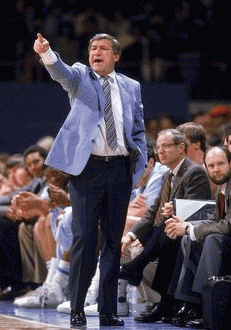Developing a Basketball Coaching Philosophy
By Dr. James Gels, From the Coach’s Clipboard Basketball Playbook"Helping coaches coach better..."
Each coach must develop his/her own coaching philosophy, or system of beliefs and ideas. When interviewing for a coaching position, the question almost always comes up, "What is your coaching philosophy?"
Be yourself
Very important, whatever your style of coaching, be yourself. I mean this especially in your temperament. If you are out-going, be out-going. If you are quiet, be quiet. If you are a screamer, scream (within reason). Don't try imitate some famous coach that you idolize. Certainly, there may be many excellent ideas and qualities that you can and should learn from successful coaches like Coach Wooden and others, but incorporate them into your own philosophy.Whatever your style, be agreeable and, without compromising your principles, be someone that is easy to work with. You will have to interact and deal with a lot of people... players, administration, faculty, parents, assistants, opposing coaches and players, officials, fans, etc. We all like working with someone who is easy to work with, who follows the rules and is respectful of others.

Legendary Coach John Wooden
Your teaching style
Coaching basketball is teaching... teaching not only fundamentals, how to play the game, and team skills, etc., but also life skills. Be well-prepared for practices and games. Encourage players. Be positive. Whatever your style, have a passion for the game. If you are enthusiastic and upbeat, this will spill over to your players and everyone around you. Value all your players. Make the 15th player on the squad feel as important as your star player. This is all-important in developing team spirit and chemistry.Be organized
You are the leader and must be organized. A disorganized coach imparts this disorganization and a sub-standard approach to the entire program. If you are not organized, others (including players) will not take you and your program seriously. Everything must be organized... practices, game routines, schedules, year-end banquet, team camps... essentially your entire program.When parents expect practice to be over at a certain time, end it then, not 20 minutes later. Start practices on time. If you must be late, make prior arrangements with your assistants. Have your "paperwork" done... scorebook entries, stats sheets, your school's athletic code of rules and policies, etc. Make notes and reminders so that you don't forget to do things that you have promised to do. Surround yourself with good people... loyal, dedicated assistants who share your passion for the game.

Be open, learn from others
All great coaches have learned what they know from other coaches and players. Don't take the attitude that you have all the answers and are the greatest coach to ever walk the earth. To become a better coach, be humble and eager to learn from others. Like players, coaches should "be coachable".Attend coaching clinics and camps. There are numerous DVD's covering every aspect of the game that you can study. Go to games. Watch games on televison. Read basketball books. Assistants should try to learn everything they can from the head coach, as this is a great learning opportunity.
Impact young people
You are not their parent, but you are in a position to be a positive, important person in the lives of each of your players. Never lose site of this. Teach by your example and how you treat others. Be a person of integrity. Players are looking for your guidance, your belief and trust in them, and your discipline. Be their mentor more so than their friend (although you will develop strong friendships with most).Treat players with respect and make them all feel important as individuals and members of the team. Have fun with them, but be sensitive to their needs. Help develop character, not "characters". Help young people to develop priorities... spiritual > family > school > basketball. The coach-player relationship is a vital cornerstone to successful coaching.
Communicate with your players as a group and one-on-one, and maintain an open door policy. Before the season starts, meet with each player individually about goals, expectations, etc. Have occasional team meetings to discuss "issues". Ask players for their input at halftime.

Duke Coach Mike Krzyzewski
Sometimes kids need verbal motivation. We tell our players that if a coach yells at you in practice, it's not because he dislikes you, but because he loves you and thinks you have the potential to be a better player. And if you never get yelled at, you might start worrying that coach is ignoring you.
Set rules and maintain discipline
But don't have too many rules that you will later regret. Kids will violate the rules... they always have and always will. Be prepared to handle things in a fair manner. But don't paint yourself into a corner by having too many rules and by being overly inflexible.Don't make a hasty decision or comment. First find out the details of what happened, the school's policy, and get the advice of your athletic director. Think also what long-term impact your decision will have on the individual(s), the team, your program, the school, and the community.
Discipline also means doing the right thing and doing everything for the betterment of the team. In practice, this means doing every drill the right way, every time.
Style of play
Some coaches are "go" coaches and like the fast-break, full-court press, gambling, trapping, and like the game to be a track meet. This style of play is ideal for a team with lots of quick, athletic players and a deep bench, allowing for lots of substituting. This style is often liked by players, parents and fans because it lets players "play the game" and more players get playing time, helping maintain team harmony.Other coaches are "whoa" coaches who like a more deliberate, slower-paced game with little risk taking. This style favors a team with strong inside post players who are better in a half-court type of game. Teams without quick, good ball-handling guards would do better with this style of play. Teams with very little bench depth will benefit from a slower paced game as key players will be able to play more minutes. Additionally, coaches may feel they have more control and more control over each possession.
Flexibility is key here. Some years, you may have race horses and you can use the running game. Other years, you may have mules and bulls and will find the slower paced, inside power game better. Even if you are a coach that structures your entire program on one style of play, you may find that you will need to be flexible in some game situations. For example, we like to press and run. But when we have a couple of our slower players in the game, we may have to drop the press in favor of good half-court defense.
Although our basic system may be the same from year to year, our play calling will change. Some years, we have a good post player and we will use plays designed to get the ball inside. Other years, our shooting guard or our point guard may be our best player. We will use plays designed to get our best shooters open shots.
Prepare your team
Preparing your team for a game is more important than any courtside game-coaching "wizardry". It's true that good coaching may help determine the outcome of a closely played game, but preparation is much more important. Preparation means teaching kids correct fundamentals and team skills.Having great practices are key as you "play like you practice". If you play and compete hard in practice every day, it's more likely you will play that way in a game. So make your practices competitive and upbeat. Prepare a lesson plan for each practice, selecting those drills that will complement your style of play and game plan.
Know your opponent through scouting, film, and previous experience. Work on your game plan in practice... how you are going to stop them defensively, and what you can do offensively.

Coach Pat Summitt
Foster a great work ethic
Once they lace up their shoes and walk onto the court, all of the day's problems and issues are put aside, and each player must focus on the job at hand. Each player owes it to the other players to practice and compete as hard as he/she can. Every player, coach, assistant, and manager has a job to do. Your star players and seniors should lead by example and work hardest of all, and set the tone for the entire team.Team concept
The coach must instill the concept of "team", rather than the individual. A cooperative team spirit must be cultivated both on and off the court. A team whose players come to understand that they are part of something more important and bigger than their individual considerations, and become unselfish in their thinking, will achieve more and will obtain more satisfaction from the overall experience. A team must arrive at the notion of a singleness of purpose and a dedication to the course. The idea of "don't let your buddy down" is a good one.Belief in the system
You must get everyone onboard to believe in your system and your style of basketball. Players and assistants must be totally dedicated and believe in what they are doing. Instruct, explain, diagram what you are trying to do. Players must be confident that (all other things being equal) if they practice hard, prepare, and play hard, they are more likely to win. The team that plays and practices hardest usually wins.Goals
Set goals for your team, your program, and your individual players. Having fun should be at the top of the list. Most players will never play college basketball. Even those who do, will often return several years later and say that playing high school basketball was the most fun they ever had. This is one of the best compliments they can give you.Team goals could vary from year to year. A team goal might be to win the state championship, or the conference title, or maybe to finish above .500 with a winning record. With a team lacking in talent or experience, it might be to just be a better team by the end of the season, in preparation for next year.
Individual player goals might be developing a post player's moves and strength, or a guard's dribbling, ball-handling, and shooting. Personal character goals are even more important... developing priorities, commitment, work ethic, trust, loyalty, etc.
Winning effort
"If you make every game a life-and-death thing, you're going to have problems. You'll be dead a lot." - Hall of Fame Coach Dean Smith
North Carolina Coach Dean Smith
Winning effort also goes back to work ethic and competing as hard as you can every practice. Players make each other better by competing hard in practice. If your team does not compete hard in practice, it's unlikely that any pre-game motivational speech will get them to play any harder.
Further, we stress that "having fun" is competing as hard as you can. The most enjoyment and satisfaction occurs when you have given all you can against a worthy opponent. A little goofing around and joking from time to time is fine, but it is not on same level as the fun obtained from competing hard.
Measuring success
We all get caught up in wins and losses. Coaches are remembered for achieving milestones such as career wins and championships. It is true of course that good coaching, teaching fundamentals, developing your program, passion, dedication, hard work, etc will translate into more wins.But not all coaches are blessed with talent every year. Recently, I witnessed an excellent coaching job done by a freshmen coach who took a bunch of inexperienced kids with poor fundamentals and no confidence, to become a winning team by season's end. Overall they had lost more games than they won, but by the end of the season, they were beating teams that had easily defeated them earlier in the season. The season ended with the boys having a sense of pride and feeling good about themselves and eager for the next season. So you see that great coaching is not always accurately reflected by the won-loss record.
Better measures of success would be the fun your team and individual players had, and how well they learned, developed, improved, and matured to become better players, students and citizens.
Related pages:
- Writing a Coaching Philosophy by Ari Fisher
- Importance of a Strong Coach-Athlete Relationship
- How to Build a Basketball Program